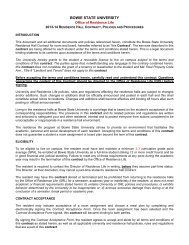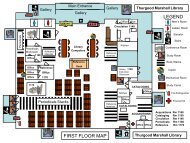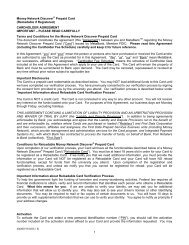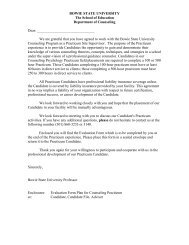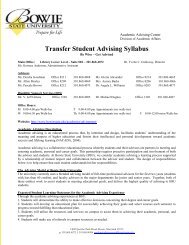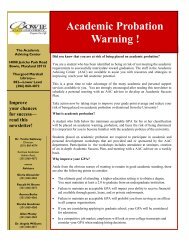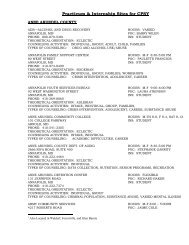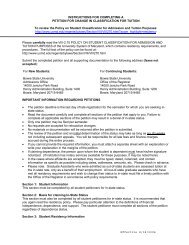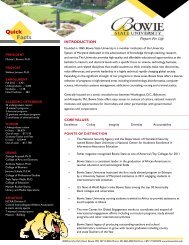2009-2010 - Bowie State University
2009-2010 - Bowie State University
2009-2010 - Bowie State University
You also want an ePaper? Increase the reach of your titles
YUMPU automatically turns print PDFs into web optimized ePapers that Google loves.
PHYS 301 QUANTUM MECHANICS (Periodically) 4 CREDITS<br />
Prerequisite(s): MATH 300 or Above. This course covers the origin of quantum theory, Schroedinger equation for simple systems, and<br />
Harmonic oscillator.<br />
PHYS 302 NUCLEAR AND PARTICLE PHY (Periodically) 4 CREDITS<br />
Prerequisite(s): PHYS 205 or PHYS 273 or Permission of Instructor. This course covers properties and atomic nuclei, their observation and<br />
interpretation; radioactive radiations, scattering, natural and induced disintegration; binding, excitation and structure of nuclei; various nuclear<br />
models; and is an introduction to elementary particles and their classification and Isospin, strangeness, and hypercharge.<br />
PHYS 303 ELECT. AND MAGNETISM (Periodically) 4 CREDITS<br />
Prerequisite(s): PHYS 272 or PHYS 252 and MATH 225. This course covers electric fields and potentials, dielectrics, steady currents, magnetic<br />
flux, electromagnetic induction, alternating currents, Maxwell's equations and their applications to electromagnetic waves and wave guides.<br />
PHYS 305 OPTICS (Periodically) 4 CREDITS<br />
Prerequisite(s): PHYS 252 or PHYS 272 and MATH 226. This course is an intermediate study of physical and geometrical optics.<br />
PHYS 308 MECHANICS I (STATICS) (Fall) 3 CREDITS<br />
Prerequisite(s): PHYS 252 or PHYS 272 and MATH 226. This course covers concepts of status, including force systems; equilibrium conditions;<br />
simple structures; distributed forces; shear force and bending moments.<br />
PHYS 309 MECH DYNAMICS (Spring) 3 CREDITS<br />
Prerequisite(s): PHYS 308. This course covers concepts of dynamics, including kinematics of particles, velocity and acceleration; Newton's Laws<br />
of Motion; momentum; work; energy; dynamics of systems of particles; and kinematics and dynamics of a rigid body.<br />
PHYS 310 APPLIED PHYSICS 5<br />
This is an algebra‐based course covering application of principles of Physics toward the creation of new and modification of existing designs in<br />
the fields of Mechanics, Fluid Dynamics, Thermodynamics, Electricity, Magnetism, and Optics. The emphasis is made on intensive computer<br />
aided design training strengthened by the requirement of design’s theoretical analysis (preferably in the fields of medicine, robotics, or<br />
biotechnology). Students may not receive credit toward graduation for both PHYS 310 and PHYS 308 (Mechanics I. Statics), or PHYS 309<br />
(Mechanics II. Dynamics).<br />
PHYS 401 LINEAR NETWORKS (Periodically) 3 CREDITS<br />
Prerequisite(s): PHYS 205 or PHYS 273 and MATH 300. This course covers signals and waveforms, average value and RMS network concepts;<br />
elements and parameters; Kirchhoff's laws; simple networks; energy and power, differential equations of networks and their solutions; phasors<br />
and steady‐state analysis, measurement impedance concepts, resonance and filtering.<br />
PSYC: PSYCHOLOGY COURSE DESCRIPTIONS<br />
PSYC 101 GENERAL PSYCHOLOGY (Fall, Spring) 3 CREDITS<br />
This course is a survey of the basic research and theories in the field of psychology, including principles of learning, developmental and social<br />
psychology, psychological measurement, and an overview of personality and mental health. (NOTE: May be taken for honors credit.)<br />
PSYC 198 COOP‐PSYCHOLOGY 12 CREDITS<br />
PSYC 200 INTRODUCTION TO PSYCHOPATHOLOGY (Fall, Spring) 3 CREDITS<br />
Prerequisite(s): PSYC 101. This course is an overview of abnormality throughout history in terms of definition, explanation, and treatment,<br />
followed by a contemporary focus on assessment and diagnosis. There is specific study of causes, epidemiology, symptoms, and treatment of<br />
the following: anxiety, samatoform, dissociative, bipolar, organic, delusional, and childhood disorders, schizophrenia, phobias.<br />
PSYC 202 PSYCHOLOGY OF LEARNING (Fall, Spring) 3 CREDITS<br />
Prerequisite(s): PSYC 101. This course examines theory and research in animal and human learning, emphasizing findings from classical<br />
(Pavlov) and operant (Skinner) conditioning in terms of the processes of acquisition, extinction, discrimination, and<br />
generalization. Demonstrates how these types of learning have been applied to human problems in the form of cognitive‐behavioral<br />
therapies. In addition, contemporary issues are examined from the perspectives of verbal learning, memory, and biology.<br />
PSYC 204 STATISTICS I (Fall, Spring) 3 CREDITS<br />
Prerequisite(s): PSYC 101, MATH 125. This course is an introduction to basic descriptive and inferential statistics as they are utilized in<br />
psychology and education.<br />
PSYC 205 EXPERIMENTAL PSYCHOLOGY (Fall, Spring) 4 CREDITS<br />
Prerequisite(s): PSYC 101, PYSC 204. This course is a study of experimental methods and their applications to the field of psychology, with<br />
emphasis on developing skills in designing, conducting, and evaluating research.<br />
PSYC 210 HUMAN SEXUALITY (Fall Only) 3 CREDITS<br />
Prerequisite(s): PSYC 101. This course is designed to assist students in furthering their knowledge of the psychological aspects of<br />
sexuality. Topics investigated will include psychosexual development, sexual identity, sexual norms, sexual problems/treatments, and<br />
research.<br />
PSYC 298 COOP‐PSYCHOLOGY 12 CREDITS<br />
PSYC 301 APPLIED BEHAVIOR ANALYSIS (Fall, Spring) 3 CREDITS<br />
Prerequisite(s): PSYC 202. This course examines and evaluates techniques of behavior change based upon experimentally derived principles of<br />
learning as they are applied in clinical and education settings and in the home.<br />
PSYC 302 CHILDHOOD AND ADOLESCENCE (Fall, Spring) 3 CREDITS<br />
Prerequisite(s): PSYC 101. This course is a study of physical, cognitive, and social development that occurs in the child's development from<br />
birth to adolescence with emphasis on the interaction among the various domains in which development progresses.<br />
PSYC 304 COGNITIVE PSYCHOLOGY (Fall, Spring) 3 CREDITS<br />
Prerequisite: PSYC 101. This course is designed to acquaint the students with the major explanations, principles, and applications of human<br />
cognition. It will include discussions of concept formation, psycholinguistics, memory, problem solving, and cognitive development.<br />
386 <strong>2009</strong>‐<strong>2010</strong> Undergraduate Catalog




